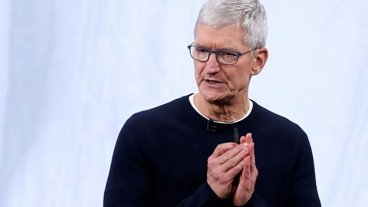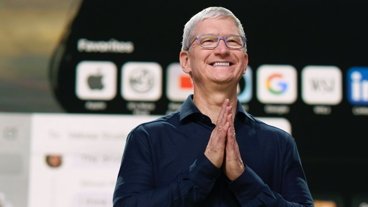Apple's Mac growth a standout in ailing PC market
Davenport's career focus on supply chain analysis is reflected in his comments, which pared Apple away from the core of the tech market in terms of expectations. Apple's positive earnings results are "not a positive tech data point," but rather "an anomaly (from a supply chain perspective, IBM’s recent results were negative, not positive), as evidenced by the plethora of negative data points up, down, and around its supply chain," according the Davenport note.
Apple reported sales of 2.52 million Macs in the final quarter of 2008 (the company's fiscal 2009 Q1), down 3% from the previous September quarter but up 9% from the year ago winter quarter. According to IDC, the worldwide PC market actually shrank slightly over the past year, making Apple's 9% growth, and its ability to once again beat analyst's expectations, a standout success.
Apple reported revenue growth of 4.4% above street expectations this quarter, hitting a new record of $10.167 billion; the Street had called for $9.742 billion. Apple's quarter over quarter revenue growth was 28.8%. Both figures reflect Apple's GAAP reporting, which banks away much of its iPhone revenue on a subscription reporting basis.
PC expectations coming to a sad realization
In November, Dell and HP reported revenues and guidance that were 8.6% and 5.9% below Street expectations. Davenport called particular attention to weaknesses in the supply chain reported this month, with CPU maker Intel guiding revenues 3.8% below expectations, GPU maker NVIDIA bracing for revenues 38.7% below expectations, hard drive maker Seagate reporting revenues 7.7% below and guiding for results 17.7% below the Street.
PC operating system supplier Microsoft reported revenues 2.7% below expectations and declined to provide guidance use to the unpredictable level of volatility in the market. Microsoft's poor earnings reports reflected the company's unrealized forecast that the PC market would expand by 10-12% in the December quarter rather than falling flat. Microsoft stated that traditional PC sales were actually down 10%, a drop offset only by netbook sales.
Microsoft CFO Chris Liddell reported that the drop in conventional PC sales resulted in a 1% decline in Microsoft's OEM Windows unit sales to PC makers, but a 12% drop in OEM licensing revenue. The shift toward netbooks has hammered Microsoft's ability to sell its more expensive business and consumer premium versions of Windows, as Vista is not designed to work on the low end mini-notebooks with reduced memory and performance characteristics.
Even as premium PC sales erode away and are replaced by cheaper netbooks, Microsoft expressed confidence that the new form factor wouldn't give Linux any competitive standing to make further inroads into the PC market, citing statistics that 80% of netbooks ship with a copy of Windows. Even if Microsoft can continue hold back Linux adoption on netbooks, it will still face a growing chunk of the lucrative premium PC market falling to a device that can't run Vista or the new Windows 7. At the same time, Apple is expanding its footprint over the remaining premium PC market, syphoning off customers who are unlikely to return to the Windows fold.
PC sales poised to slip further
With so many PC suppliers posting bad news and pessimistic guidance, Davenport wrote that the current estimates for Dell and HP are too high. The Street is currently modeling Dell's revenues to slip 2.9% quarter over quarter, and for HP to fall by 4.3%.
Neither PC maker has the brand loyalty of Apple among consumers, and both will suffer from tighter corporate and government spending, just has Apple has in its education sales. Apple itself is preparing for a tough year, with weaker retail sales and no end in sight to the economic pressures hitting institutional buyers.
Apple still has a couple tricks still up its sleeve; it has yet to refresh its flagship desktop, the iMac, as well as its lower priced Mac mini model. The company will also be releasing the new Mac OS X Snow Leopard this year, which promises to give the Mac maker a new bump in mindshare among consumers. Microsoft's new Windows 7 operating system may provide a shot in the arm for PC makers, but won't run on the netbooks that are currently defining all the growth in the PC market.
 Prince McLean
Prince McLean










 Malcolm Owen
Malcolm Owen
 William Gallagher and Mike Wuerthele
William Gallagher and Mike Wuerthele
 Christine McKee
Christine McKee
 William Gallagher
William Gallagher

 Marko Zivkovic
Marko Zivkovic









